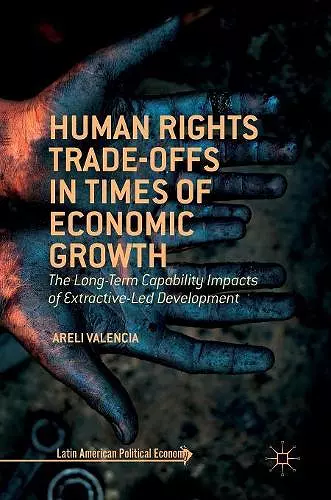Human Rights Trade-Offs in Times of Economic Growth
The Long-Term Capability Impacts of Extractive-Led Development
Format:Hardback
Publisher:Palgrave Macmillan
Published:5th Nov '16
Currently unavailable, and unfortunately no date known when it will be back

"Much work has been published on human rights violations generated by recent mining activity. Areli Valencia's work is exceptional in analyzing the history of conflict and rights abuse in an old mining region, a smelter town set up in highland Peru more than a century ago. Her carefully researched and original work probes the ways in which mining closed the range of choices available to local people, leading to a systemic lack of freedom, structured by the decisions of the state and corporations, then and now. It is essential reading for all concerned about the long- term consequences of reliance on extraction." (Liisa North, Professor Emeritus, York University, Canada) "The basic line of the human development paradigm is that people are the real wealth of nations, not what economies produce. In this book, Areli Valencia shows that the fallacy that growth of domestic output amounts to progress remains well entrenched in collective imaginaries. On the basis of rich evidence from Peru, she examines why this fallacy persists amidst the evidence of its destructive impact on people's lives and the environment. She takes the reader to the historical and socio-political causes of this puzzle. Why do people defend what harms them? Her findings have an urgent resonance. Her proposed 'Human Rights Systemic Analytical Model' provides constructive foundations for a global political economy based on the respect of the inalienable dignity of every human person. Human Rights Trade-Offs is required reading for anyone who seeks to understand why human rights are so much talked about and so little respected." (Severine Deneulin, Associate Professor in International Development, University of Bath, UK) "Areli Valencia's insightful book shows how the systematic denial of the freedom to develop human capabilities undermines fundamental rights in ways that are not well understood within a liberal or negative rights framework. By showing how situations of systemic unfreedom or economic dependency can undermine the development of capacities for agency and rights assertion, Valencia explains the puzzling fact that miners in the Peruvian smelting town of La Oroya, who are victims of heavy metal poisoning, nevertheless deny their rights are being violated and instead seek to protect the very jobs that make them and their families sick. She also shows how systemic unfreedom cannot be redressed through the normal remedies for rights violations but instead require longer-term structural transformations. This is a profound contribution from the perspective of the "capabilities approach" to our understanding of extractivist development." (Maxwell Cameron, Director of the Centre for the Study of Democratic Institutions, University of British Columbia, Canada)
This book uncovers a historical dependency on smelting activities that has trapped inhabitants of La Oroya, Peru, in a context of systemic lack of freedom.This book uncovers a historical dependency on smelting activities that has trapped inhabitants of La Oroya, Peru, in a context of systemic lack of freedom. La Oroya has been named one of the most polluted places on the planet by the US Blacksmith Institute. Residents face the dilemma of whether to defend their health or to preserve job stability at the local smelter, the main source of toxic pollution in town. Valencia unpacks this paradoxical human rights trade-off. This context, shaped by social, historical, political, and economic factors, increases people’s vulnerabilities and decreases their ability to choose, resulting in residents' trading off their right to health in order to work. This book shows the deep connection of this local dilemma to the country’s national paradox, arising out of Peru's vision of natural resource extraction as the main path to secure economic growth for the entire country at the expense of some groups.
“Drawing on a detailed, rich and insightful case study, this book deals with the case of the smelting town of La Oroya in Peru. … This study is very useful for researchers, activists and community leaders alike dealing with human rights, human development and socio-environmental trade-offs, as well as for those interested in the structural roots of institutional and legal contexts in the region and beyond.” (Johannes M. Waldmüller, Journal of Human Development and Capabilities, Vol. 20 (1), 2019)
ISBN: 9781137488671
Dimensions: unknown
Weight: 4955g
281 pages
1st ed. 2016